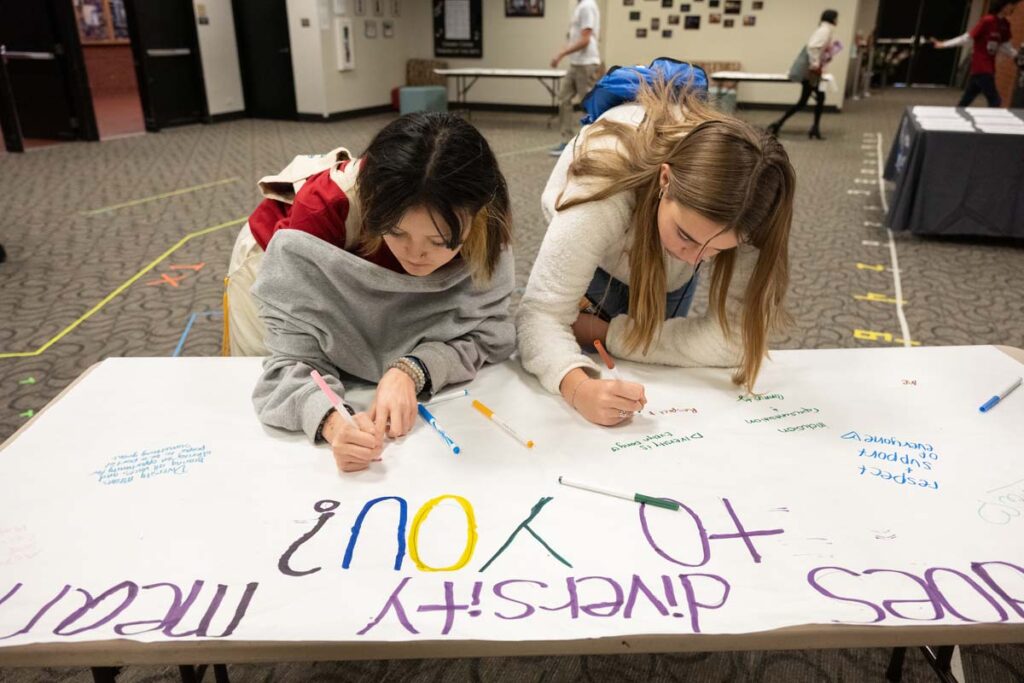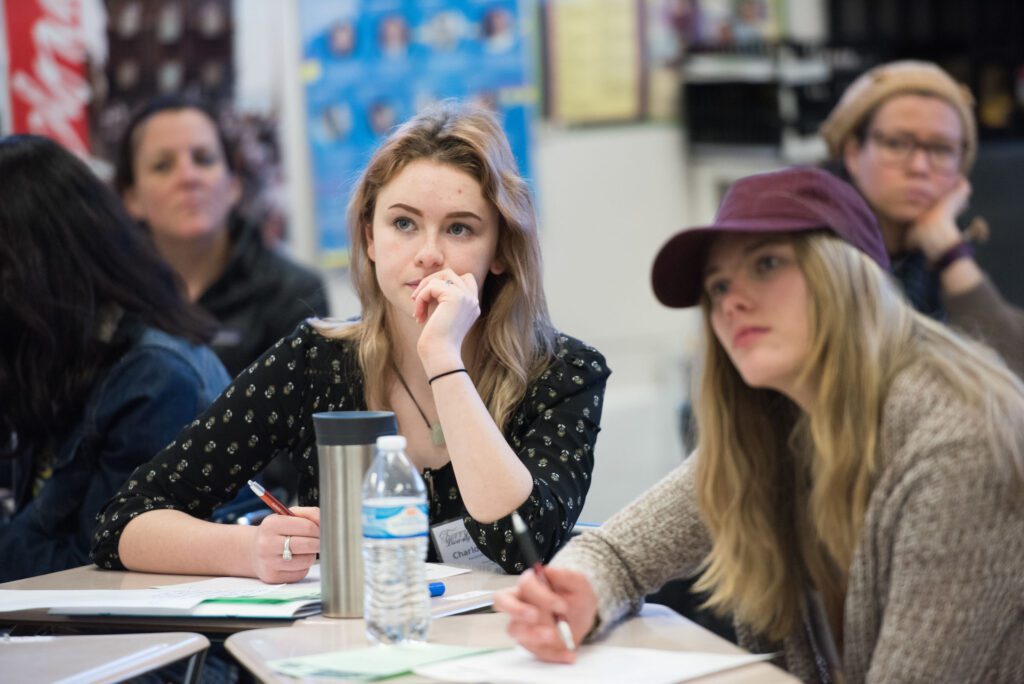We empower and connect young people to speak and work across religious traditions to build community and advance social justice.
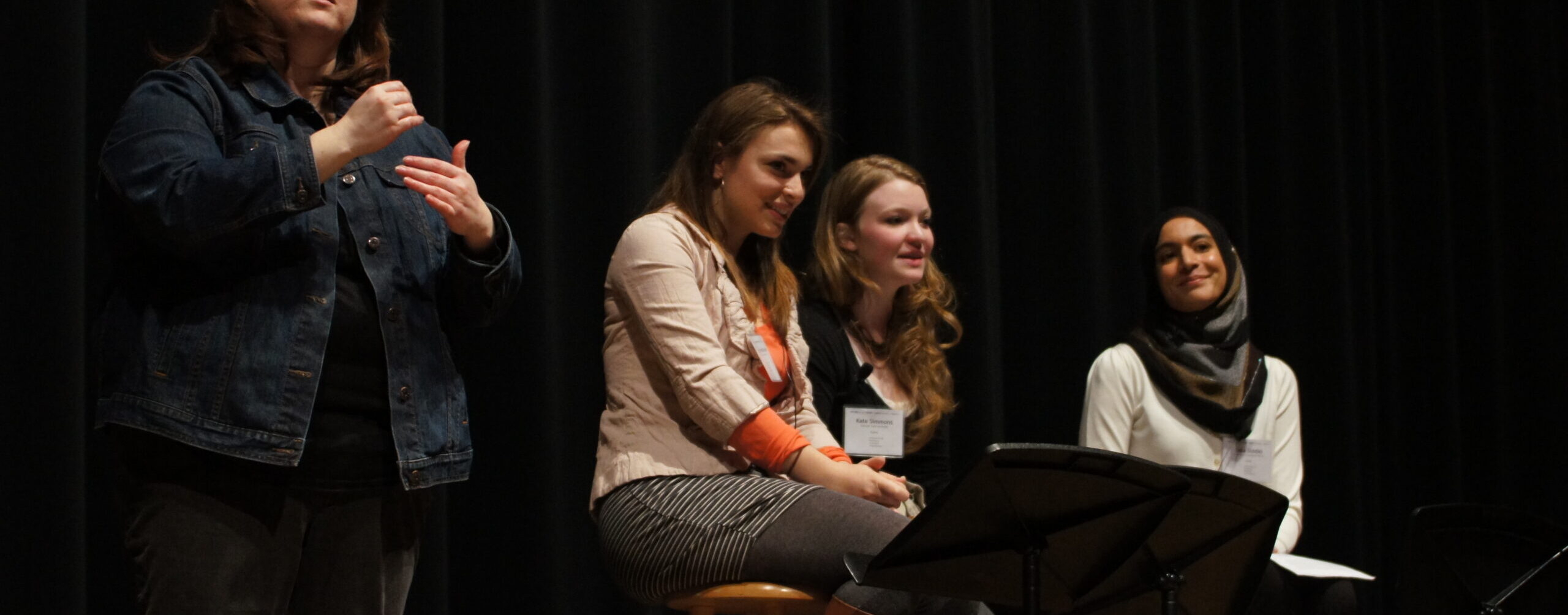
Jump to a section:
Important Interfaith and Religious Justice Terms
- Interfaith dialogue: people of different religious faiths coming together to have a conversation. Interfaith dialogue is not intended to be a debate; it is aimed at mutual understanding. (US Institute of Peace)
- Interfaith cooperation: a process in which people who orient around religion differently come together in ways that respect different identities, build mutually inspiring relationships, and engage in common action around issues of shared concern. (IFYC)
- Antisemitism: prejudice against or hatred of Jewish people. It has often taken the form of systemic discrimination against and persecution of Jews. Antisemitism has repeatedly led to serious and deadly violence against Jewish people. (US Holocaust Memorial Museum)
- Islamophobia: anti-Muslim racism, or an industry that generates fear of Islam and anti-Muslim bigotry. (ING)
- Hate crime: a violent or property crime — such as murder, arson, assault or vandalism — that is “motivated in whole or in part by an offender’s bias against a race, religion, disability, sexual orientation, ethnicity, gender, or gender identity.” (FBI / Southern Poverty Law Center)
It is important to understand that, in general, interfaith dialogue and cooperation is not focused on learning about religions you are unfamiliar with, as much as it is about bringing multiple faith communities together to advance policy, advocacy and laws that the faiths agree on.
Most interfaith organizations focus their energy on protecting religious liberty and pluralism; economic justice issues, including aiding the homeless; racial justice; and other social justice issues.
Why Interfaith Dialogue and Cooperation Matters
- Over half (54%) of Jewish Americans have either experienced or witnessed some form of incident that they believed was motivated by antisemitism over the past five years. About half (49%) of Jewish Americans have heard antisemitic comments, slurs or threats targeted at others. One-in-five (21%) have been the target of antisemitism comments, slurs or threats. The same number (22%) report vandalization, damage or defacement of a Jewish institution they are associated with because of antisemitism. (ADL)
- Muslims are the most likely religious group to report experiencing religious discrimination (62%). Muslim women report higher levels of discrimination (68%) than men (55%). Muslim women are also more likely to report gender discrimination from the public than are any other group of women surveyed (36%). (Institute for Social Policy and Understanding and Georgetown University)
- Knowing a Muslim personally is among several protective factors against Islamophobia. When a Muslim is a close friend, Islamophobia is further reduced. (Institute for Social Policy and Understanding and Georgetown University)
- Nearly one in five hate crimes committed in the U.S. in 2018 were motivated by religion, second only to race. (FBI)
Interfaith Leaders Who Inspire Us
Here’s a list of folks who are leading interfaith dialogue and cooperation today. They inspire and inform our work. Follow them on social media, or seek out opportunities to hear them speak to dig deeper on these issues.
YCD Workshops on Interfaith Dialogue and Cooperation
YCD has a curated library of over 60 workshop guides on every aspect of inclusion and justice work for middle and high school youth to explore in their own youth-led club or group — with new workshops being published every month. These guides can also be used by educators as part of their in-school curriculum, where interested.
Below is a free sample workshop created by YCD on the topic of interfaith work and religious justice, available for anyone to use and download.
Exploring Interfaith Cooperation for Social Justice
Participants explore how Muslims and Jews (and people from other religious traditions) can work together across identity for social justice.
Other topics available as downloadable workshop guides or offered at YCD conferences/events include:
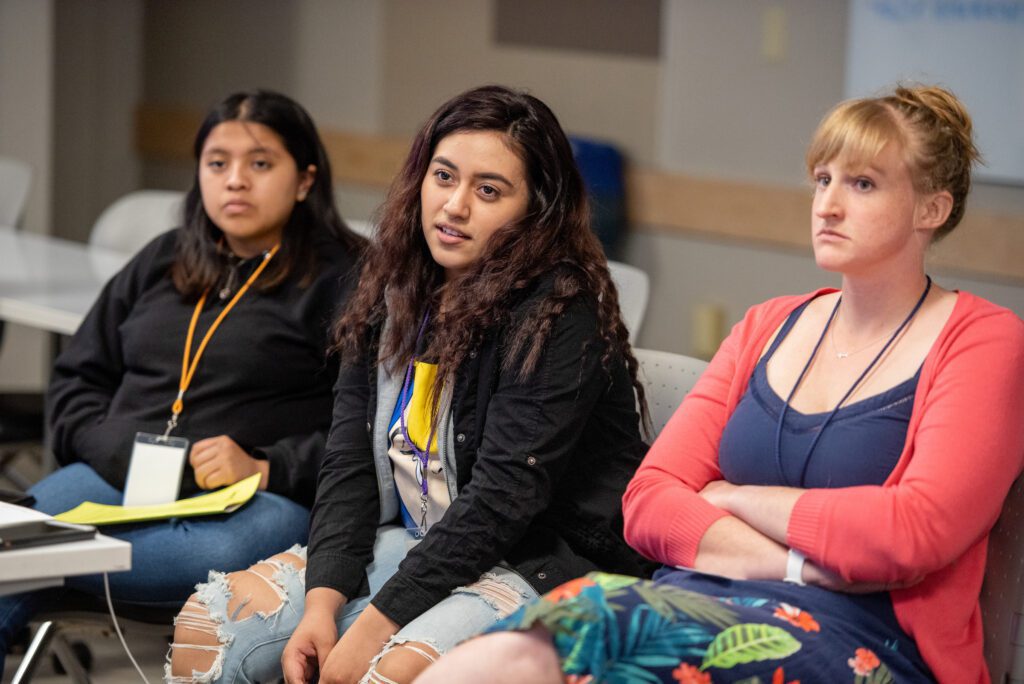
Faith, Belief, Religion, and Worldview
Participants will reflect on the intersections of students’ faith and belief identities with their other social identities. We will explore the differences between faith, belief, religion and worldview; current religious/spiritual trends; consider why interfaith dialogue is so important; and discuss challenges that students might face regarding their worldviews.
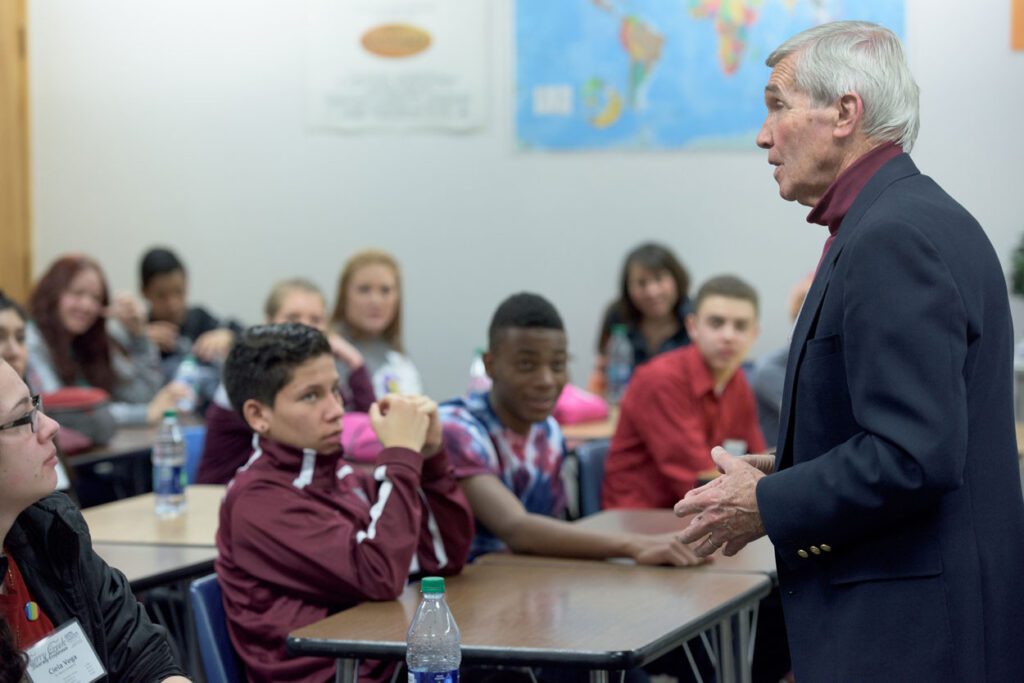
A Holocaust Survivor Speaks
A survivor of the Holocaust will share stories about living through a period of time where diversity and respect for others was at its lowest point in human history. Most importantly, participants will understand why we must never forget what happened in the Holocaust.
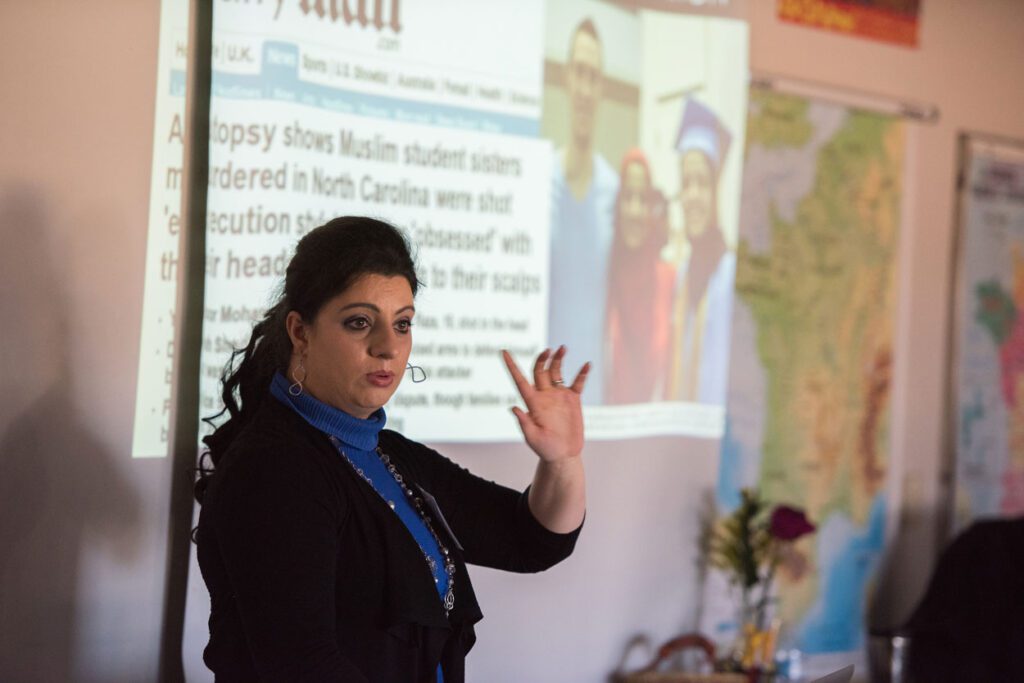
Islam and Islamophobia
Islamophobia is the discrimination and oppression of Muslims. This workshop will serve as an open forum for students and adults to ask questions freely as they learn some of the common myths and misconceptions surrounding the Islamic faith and Muslim people. This session will also help participants understand how xenophobia against any race, religion or ethnicity should not be tolerated.
To experience these workshops, YCD events, and much more, start or join a YCD chapter!
Videos to Explore Interfaith Dialogue and Cooperation
Confronting Anti-Semitism and Islamophobia
Listen to this webinar to hear from Jewish and Muslim community leaders about their experiences with religious and ethnic-based hate and marginalization; the connections between anti-Semitism and Islamophobia; and strategies on how to respond to hate and discrimination when you witness or experience it.
What does interfaith cooperation look like?
How can people from different religious and faith traditions work across divides on issues relating to social justice?
A Holocaust Survivor Speaks
Holocaust survivor Eric Cahn shares his personal story of growing up in Germany during the Nazi takeover, and how he was rescued by the French Resistance.
Understanding Islam
What are some major misconceptions of Islam and Muslims? Hear an interview between a high school student and the leader of the Colorado Muslim Speakers Bureau for some basic information about the religion.
Understanding Judaism
What are some major misconceptions of Jews and Judaism? Hear an interview between a high school student and a member of the Jewish faith.
Stay up to date for future student-generated videos on this topic and more by subscribing to YCD’s YouTube channel.
Interfaith and Religious Diversity Books for Students
Here is a list of recommended books for students and teens that explore and address interfaith dialogue and religious diversity. You can find free e-books or your local library using OverDrive.com.
Interfaith and Religious Diversity Books for Educators and Adults
And this list is for teachers, educators and adults looking for guidance on interfaith dialogue and religious diversity.
Movies with Religious or Interfaith Themes
Below are movies that feature interfaith relationships or provide insight into various religious traditions in meaningful and compelling ways.
Podcasts on Interfaith Dialogue or Religious Diversity
Here is a list of recommended podcasts you can download and follow to explore interfaith dialogue or specific religious traditions in more detail.
Ideas for Local Action to Create Interfaith Dialogue and Cooperation
- For groups that haven’t engaged in interfaith dialogue before, establish trust and awareness for each other’s religious traditions and worldviews. One method to try is an interfaith potluck, where each participant brings a dish connected to their family’s culture, and the group shares about their various religious or cultural histories. Here’s a useful guide for planning an interfaith potluck from IFYC (requires free registration).
- Is there a religious minority in your school or community that is not well understood? Consider a group outing to a local house of worship (mosque, temple, shrine, etc.) to learn more about the faith and create personal connections. Do not show up uninvited; contact the house of worship in advance to see if they welcome visitors and have specific times set aside for school or community groups to visit and learn. Not all groups will want to invite visitors into their house of worship, which is okay. If they invite your group to visit, plan ahead by reading the appropriate section of the book How to be a Perfect Stranger: A Guide to Etiquette in Other People’s Religious Ceremonies. Have a group discussion in advance of visiting about how to be respectful, and plan another post-visit conversation to process what the group learned, and what actions your group can take to stand up for religious minorities facing bigotry.
- Check if there is an interfaith organization or affiliation that is operating in your region (the Interfaith Alliance is a good place to start; here is a map of affiliates across the U.S.). Invite the leaders to share what initiatives they are currently working on, and seek their guidance on how your group can support or get involved. This may take the form of advocacy (writing letters/emails to government officials, etc.), publicity of the initiative on social media, or gaining buy-in from additional congregations in your community.
- For communities that have experienced a specific hate crime or incident of religious bigotry, show up at protests, rallies or demonstrations in support of those being persecuted. Write articles in the local newspaper or go on the radio station to bring attention to and denounce the incident, and to show you and your community will not tolerate such behavior. Start or contribute to a fundraiser if there was property damage or medical costs due to injury. Reach out to the affected faith or group to ask how you can support them through this time, and honor and center their preferences and voices at all times.
- Report religious slurs, graffiti or hate-inspired markings to school or local authorities immediately. Ensure such incidents are not left unaddressed or “swept under the rug”; invite the Anti-Defamation League or other civil rights organizations to provide trainings or information to help your community address the incident. Invite faith leaders from different religions to participate in your project to show a united, interfaith stand against hate.
Do you have a suggestion of an addition or resource for this page? Share your idea with us.
